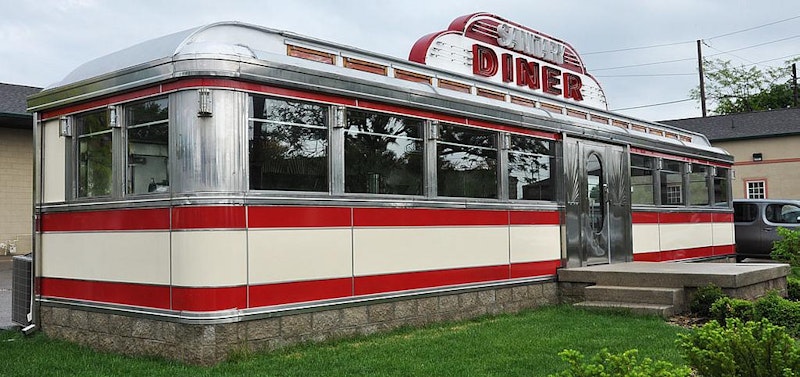American filmmaker David Lynch has had a long fascination with American diners. His films are filled with images of people enjoying coffee, eggs sunny side up or a piece of a cherry pie. A vision of some kind of wholesome and good society, as wholesome and American as apple pie is a continuous motif in the unfolding tragedies and comedies of Lynch’s characters. Most of them are yearning for peace and looking for an exit out of darkness.
In Twin Peaks, FBI Agent Dale Cooper is investigating the brutal murder of Laura Palmer, but in the midst of evil that’s lurking in the small town, Cooper is taken and mesmerized by the trees of the endless forest, returning him to a somewhat imperfect Garden of Eden. He’s seduced by a plate full of meat and potatoes, a big slice of cherry pie at R & R, and a “damn good cup of coffee.” While great evil is about to be uncovered in the idyllic town of Twin Peaks, in the deep forests of the Pacific Northwest, Cooper’s safely ensconced in the womb of simple, plain, motherly Americana. But what kind of mother?
In Mulholland Drive (2001), various characters meet at Winkie's for scrambled eggs and coffee. One scene unravels as the anxious man reveals to his therapist a nightmare he’s been having. The anxious man is unsure of himself, unhappily oblivious and simultaneously aware of his unstable malaise. He can’t shake it off. The monster is lurking but for the time being, black coffee, scrambled eggs, and the safe familiarity of Winkie's is soothing.
Lynch rarely expresses himself in the form of written word but in his book, Catching the Big Fish: meditation, consciousness, and creativity (2006), he comes close in lifting a veil on his creative process and decisions. He also writes about what meaning American diners hold for him. Lynch writes: “I used to go to Bob's Big Boy restaurant just about every day from the mid-seventies until the early eighties. I’d have a milk shake and sit and think. There’s a safety in thinking in a diner. You can have your coffee or your milk shake, and you can go off into strange dark areas, and always come back to the safety of the diner.”
You might say this is standard Lynch, but once you get on the same wavelength as him, it makes perfect sense. Fairly early after my arrival in America, I discovered this oddly happy and safe place called a diner. At first, I thought that “dinner” was spelled out “diner” and couldn’t quite understand why a restaurant would call itself that. But then Suzanne Vega's song, “Tom’s Diner,” popped into my mind which spun me into a Rolodex of songs I religiously listened to on MTV in the socialist Yugoslavia. I realized that there was a difference between a “diner” and a “dinner.”
The life of a refugee in America was, at times, alienating. You’re a foreigner in a foreign land. In Bosnian, the word “foreigner” is stranac, which is also a word for a “stranger.” It was perfect, then, that my alienation as a legal alien was also strange, and that I viewed everyone as strangers in a strange land. The absence of familiarity (which is what alienation really is) threw me into an inevitable spin of refugee resettlement, as I tried hard to both resettle and settle down my mind.
The first few years in America were extremely difficult. I wasn’t sure where the path of my life was going, or what I might encounter. The summer of 1996, the year I arrived, was filled with suffocating humidity of an old apartment, a cheap, plastic, “Made in China” floor fan, old living room couches that had unfamiliar stains, and ripped, shredded wheat kitchen chairs. It was a summer of isolation, welfare offices, nasty and haughty social workers, loud rips of the Food Stamps booklet at the grocery store, and my desire to pay with real dollars. It was a summer of my father’s death, and sitting on scorching sidewalk pavement wondering whether alienation will ever go away or will it settle in my stomach permanently? I didn’t feel like I existed and was jealous of my neighbor for receiving junk mail.
American diners were places of happiness for me. It made no sense: how could I possibly love this aesthetic anti-thesis to the European café? But I couldn’t help loving that Formica table, whose surface was slightly coming unglued. I held a cup of black coffee tightly in my hands, hoping the white and worn porcelain wouldn’t break under anxious pressure. As a child, I only loved scrambled eggs but in America, I ate eggs “sunny side up” and loved saying those newfound words to describe the perfectly still egg yolk. It’s always sunny in a diner even under the gray, snowy sky.
The waitress did indeed call me “hon” or “honey” and I didn’t mind that she said that to every worn-out face seated, waiting for a pile of pancakes, as she asked me if I want more coffee. The time, like in any Lynch film, moved slowly in a diner and the inner freedom was accompanied by safety. There is a small part of America’s soul in these diners. I felt it then and feel it now. I remember the alienation of my past and I know that it wasn’t permanent. The rest of America ceased being the unfamiliar otherness to me, and gradually, it became a home. But diners were always a home: timeless and metaphysical spaces of inner liberty, dignity, and possibility.

